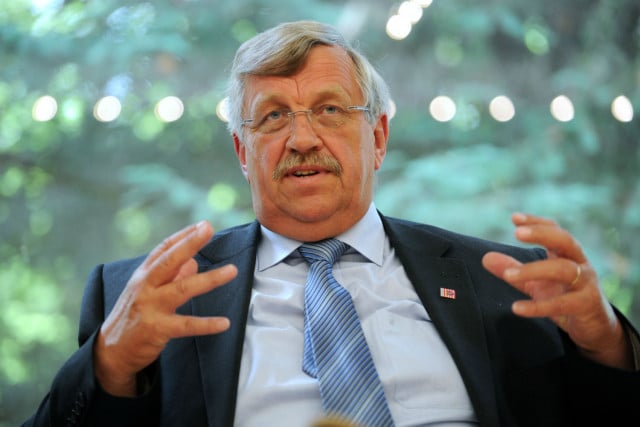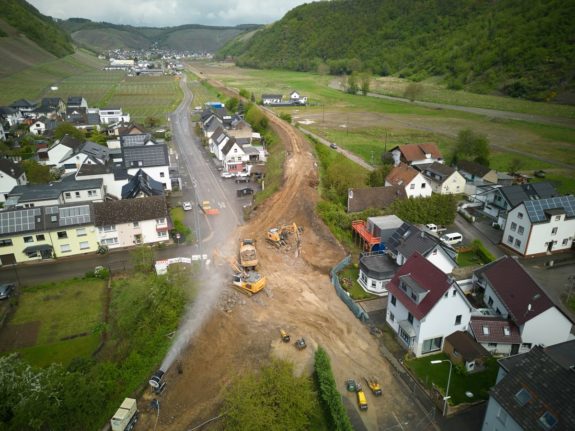Police commandos had on Saturday arrested a suspect in the June 2nd assassination-style shooting of Kassel city administration chief Walter Lübcke, 65, on the basis of DNA evidence.
“We have taken over the case,” said a spokeswoman of the federal prosecution service, which deals with crimes motivated by political and religious extremism.
READ ALSO: Political link suspected in German pro-migrant politician's murder
Authorities did not discuss the possible motive, but German media reported that the 45-year-old suspect from Kassel, Hesse state, had in the past been connected with far-right extremism.
Federal prosecutors assumed control of the investigation after “the suspicion of a right-wing extremist or right-wing terrorist background firmed up,” said the Süddeutsche Zeitung daily.
News site Zeit Online, citing unnamed security sources, partially named him as Stephan E. and said he had been previously sentenced to jail for a 1993 failed pipe-bomb attack on an asylum seekers' home in Hesse.
Three opposition parties – the Greens, Free Democrats and far-left Die Linke – urged a special parliamentary hearing into what could be Germany's first targeted killing of an elected official in decades.
Lübcke, a member of Chancellor Angela Merkel's conservative Christian Democrats, was shot in the head at close range overnight on the terrace of his home near Kassel, 160 kilometres northeast of Frankfurt.
He had passionately spoken out in defence of migrants at the height of Europe's 2015 refugee crisis, drawing the fury of the far right for telling anti-migrant agitators they “could leave Germany”.
Since his death, hundreds of posts from social media accounts tied to right-wing extremists have hailed his murder, in turn drawing strong condemnations from President Frank-Walter Steinmeier and other politicians.

Walter Lübcke's home where the murder happened. Photo: DPA
Racist hate
Der Spiegel weekly reported, without citing sources, that the suspect in custody had in the past had clear connections to the right-wing extremist scene and links to the neo-Nazi NPD party.
He had come to police attention for acts of violence as well as weapons and property offences, the magazine reported.
It said the suspect had received a seven-month suspended jail term a decade ago after he had joined right-wing radicals who attacked a May 1st Labour Day march in the western city of Dortmund.
If the shooting death was indeed motivated by right-wing extremism, it would be Germany's first political murder of an elected official in decades, recalling Britain's 2016 killing of British Labour Party lawmaker Jo Cox.
READ ALSO: Mourners gather in Hesse for funeral of murdered CDU politician
Several German politicians have been badly injured, among them parliamentary speaker Wolfgang Schäuble who has used a wheelchair since surviving a 1990 shooting by a deranged assailant, and Cologne city mayor Henriette Reker, who survived a 2015 knife assault by a man angered by her pro-refugee stance.
From the 1970s to early 1990s, Germany was terrorized by the far-left Red Army Faction, which emerged out of the anti-Vietnam war protest movement and launched a spate of shootings, bombings and kidnappings targeting politicians, police, bankers, business leaders and US troops.
More recently Germany was shocked to learn that the far-right militant group National Socialist Underground (NSU) killed nine Turkish and Greek-born immigrants and a German policewoman from 2000 to 2007, and carried out bomb attacks and bank robberies.
Free Democrats lawmaker Benjamin Strasser was among politicians sounding the alarm on Monday, telling media group RND that “for years, threats from the extreme right against politicians have been on the rise”.
“We need to decisively clear up and take effective measures against right-wing terrorist structures.”
By Frank Zeller



 Please whitelist us to continue reading.
Please whitelist us to continue reading.
Member comments